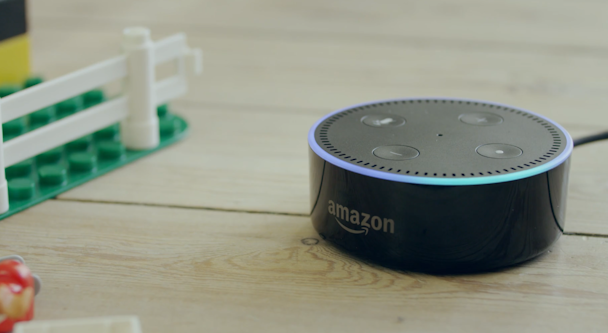The Amazon-NHS partnership isn't about putting patient data at risk. There's more to it
Amazon’s Alexa recently hit the headline of not only trade press, but mainstream tabloids with news about a new NHS integration.

Tipi Group compare Amazon Alexa and Google Assistant. / Lego
The news was met with mixed responses. The wider public reacted negatively, with concerns surfacing around data privacy, platform accessibility and the idea that the partnership could replace the jobs of doctors. Some of these concerns are well founded, other not so.
On the other hand, the voice community saw the news as a positive, noting that Amazon is taking necessary steps to ensure that users asking medical related questions are receiving answers from a trusted source.
Public disapproval might have come out of a lack of understanding how this integration works. Some reports described the integration as Skill. An Alexa Skill is a third-party app which users can open and then have back and forth conversation. This integration is not a Skill, but is at a “first-party” level meaning that, because of the integration, Alexa can now surface answers directly from the NHS website, rather than pulling them from varying and possibly unreliable sources.
What other health websites is Alexa integrated with and why?
The NHS website isn’t the only website Alexa is able to pull information from. After the news broke last week, we conducted a test which found that in a sample set of 110 medical questions, Alexa also read out answers from the Mayo Clinic US, Reference.com and Wikipedia. As Amazon mentioned, the NHS integration wasn’t exclusive, and this is clear to see from the results of the test, as seen below. They have other medical resources which their answers are pulled from.

One of the other findings from the test, was that Alexa couldn’t provide an answer for 45% of the questions asked. Reasons for this could include both Alexa’s inability to understand complicated medical terms and also the fact that the health-based websites Alexa is pulling answers from, do not have the content to answer the question. Where Alexa cannot find an answer from one of their trusted partners, it will not answer.
How does this integration compare with Google’s Assistant?
Despite understanding public concern, the voice community pointed out that Google already have a similar integration employed within their Assistant.
Running the same test with the Assistant, you can see in the table below that Google’s Assistant also pulls some of its answers from the NHS, as well as other medical resources.

The Assistant pulls its answers from Google’s search results. Results can be pulled from any website in the world, and in general, the results tend be generated from more established websites. Whilst Google has taken a practical approach using their already available data pool, in comparison with Amazon’s approach, it could lead to the Assistant providing results from websites that might not be 100% trustworthy. Whilst Alexa could only answer 60 questions (using specifically selected and trusted sources), Google’s Assistant was able to provide answers to every question but two. Amongst the ranking websites personal injury law website johnfoy.com and privately owned healthline.com had been used to provide answers.
What opportunities are brands capitalising on in the voice health space?
Many brands are actively working on gaining voice answers by creating content on their websites that can answer popular questions via the Google Assistant. As mentioned, the Google platform is more open to reading out results from any website, whilst the Alexa platform is more selective.
Multiple reports and studies have flagged that Alexa is behind the Google Assistant in its ability to answer questions. Due to this, it is likely that Amazon will integrate with more partners in order to build on the number of questions they can answer – some brands might win big if they are selected. However, given their preceding behaviour, we predict that Amazon will continue to select more trustworthy websites with an objective viewpoint to plug the gaps, such a charities and government websites.
With brands often being subjective in their web content a different route into voice could be to create an Alexa Skill or Google Actions. Both have the added benefit of being able to engage with the user beyond the one question and response.
Voice, digital and trust
There is a growing trend in the general public of not trusting large organisations, governments and social platforms. Fuelled by the Cambridge Analytica scandal, tax avoidance, multiple data breaches, Black Mirror and many further factors, the voice landscape isn’t exempt from this problem. If anything, both Google and Amazon have contributed to the problem with news that both of them had data leaks of voice recording.
With mistrust and a lack of understanding of how the technology works, for instance many think Alexa listens to you all the time, it’s not surprising that this NHS news was met with this reaction by the public.
Whilst ultimately the responsibility for the trust in this technology lies with the providers Amazon and Google we hope that by writing this article we can help to clarify any misunderstandings, in order to make the sector more transparent and accessible to the public.
John Campbell is the managing director and founder of Rabbit and Pork.
Content by The Drum Network member:

Rabbit and Pork
We are Rabbit & Pork, your Voice Experience specialists.
We build branded Voice Apps & chatbots.
UK's Best Small Companies to Work For 2018-2021...

